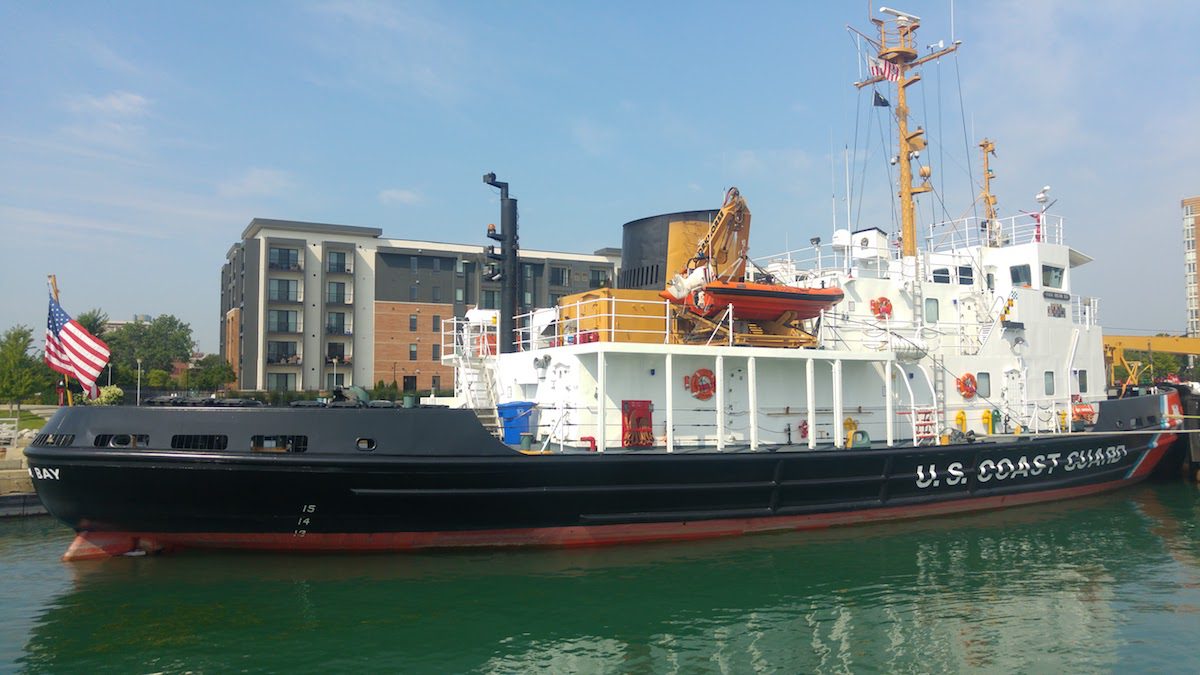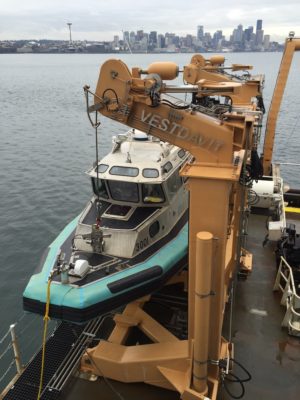Interview: Castrol’s Gianluca Marucci Talks IMO 2020
Interview by Mike Schuler – Gianluca Marucci is Global Director of Technical Services at Castrol, a leading global supplier of marine lubricants. With less than a month to go before...

Photo credit: Vestdavit
While attending the International Workboat Show in New Orleans last month, we met up with Magnus Oding, General Manager of Vestdavit, Inc, the U.S. subsidiary of Bergen, Norway-based davit and boat launching equipment supplier Vestdavit, to discuss what the company has been up to and what’s on the horizon for them.

Surprisingly, as many other companies were noticeably scaled-back due to the prolonged downturn in shipping and oil and gas, the Vestadavit team seemed optimistic and were particularly excited about the potential for growth in the U.S. market. So much so in fact, that in August 2017 the company opened a new office in Seattle so it could better serve its existing customers and also help it tap new business from the local market. It seems Vestadavit’ davits are already widely used by the U.S. Navy, Coast Guard, the National Oceanic and Atmospheric Administration (NOAA), as well as in the offshore oil industry, among others.
Already piquing our interest, we sat down with Magnus to ask a few questions about what they are doing and why they are so interested in the U.S.
Why is Vestdavit so interested in the U.S. market?
MO: The U.S. is the biggest market for Vestdavit currently and has the most future potential as well. The first delivery to a U.S. ship was in the early 1990’s and we have had success in various market segments in the U.S. ever since. We now have many davits installed on US Navy, US Coast Guard and NOAA ships as well as on commercial ships. In order to service our customers in the best way possible the decision was made to have direct representation in the U.S and we opened up a U.S. office, called Vestdavit, Inc., in September 2017.
What type of davits does Vestdavit specialize in and what kinds of vessels are they installed on?
MO: We currently have Vestdavit systems on many navy and coast guard ships around the world as well as seismic survey ships and research ships. Government customers have been our primary customer in the past few years. Our typical customer tends to be an organization that relies heavily on davits and small boat operations and uses their davit systems almost daily when out on a mission. We have customers who use their davits up to 30 times a day. These type of operators see the benefit with our advanced and reliable davits.
Our davits are typically light in weight, made in steel or in aluminum, and have a small footprint. They can be either hydraulic or electric.
What do operators need to watch out for when choosing a davit system?
MO: The davits need to be designed and equipped for the intended requirements. Higher sea states (rough weather) means that more motion compensated equipment is needed on the davit as well as higher launch and recovery speed for the davit’s winch. If the ship is weight sensitive you may want to consider having the davit made in aluminum for example. The davit’s durability and reliability are other important factors that need to be considered. We have customers who are out to sea for 2 years at a time and they need their davits to function safely each and every day.
The placement of the davit on the mothership also needs to be carefully considered in order to achieve the best possible boat handling performance.
How does the installation process work?
MO: The davit installation process can be done in a few different ways. The quickest and most economical install is when we deliver the davit mounted on a skid. Basically, all equipment is then mounted on the davit and the skid. The customer only needs to bolt the davit skid to the deck and the installation can be completed in just a few hours, which is very cost effective for the customer.
How does Vestdavit’s product differ from its competitors?
MO: We provide davits that does much more than just the bare minimum. We design and supply tailor made davits for launching and recovering boats in rough conditions. This is accomplished with safety features such as shock absorbers, wave compensation, limit switches and anti-pendulum devices in connection with a well thought out control system. The control system can include a PLC, which allows you to pre-program certain operating sequences for the davit. These pre-programmed sequences allow the davit operator to keep the focus on the small boat and its crew and makes for the safest possible launch & recovery operations. We have davit systems currently in use that are being operated in up to sea state 7, which is extremely rough conditions. Vestdavit has the most advanced motion compensated davits on the market.
What is the most interesting davit system currently in the market?
MO: Vestdavit spends a significant amount of time and effort on innovation. A system that is currently in use and gathering a lot of interest is the “MissionEase”. This system allows you to launch & recover multiple boats and crafts of various weights and sizes from the same davit. This is done by incorporating moving cradles that feed boats into the davit. The MissionEase davits are very flexible and can quickly change the configuration in order to handle both single point and dual point boats. The davits are also designed to be able to handle containers while in port.
Development work is also currently being done in order to launch & recovery unmanned crafts, such as USVs and UUVs, from our standard davit systems.
Since 1975 Bergen-based Vestdavit has supplied over 1,900 davits and side and stern launch systems, and has almost 40 years of use in the North Sea and other harsh environments around the world. You can check out more of what Vestdavit has to offer on their website https://www.vestdavit.no/.

Sign up for gCaptain’s newsletter and never miss an update

Subscribe to gCaptain Daily and stay informed with the latest global maritime and offshore news
Essential news coupled with the finest maritime content sourced from across the globe.
Sign Up